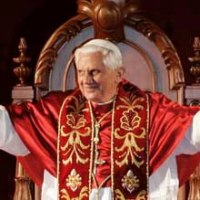Pope Benedict XVI calls Latin America the "continent of hope" in an open-air mass in Brazil
Pope Benedict XVI called Latin America the "continent of hope" in an open-air mass at Brazil and urged the region's bishops to be zealous missionaries.

"This is the faith that has made Latin America the 'continent of hope,"' Benedict told prelates from across Latin America and the Caribbean and a crowd of nearly 150,000 gathered outside the mammoth basilica of Aparecida.
As hundreds of choir members sang hymns and the faithful waved flags from all corners of South America, the German-born pope said the bishops must be "courageous and effective missionaries" to ensure the strength of the church.
But the turnout fell far short of the 400,000 to 500,000 worshippers local organizers hoped would show up for Benedict's last big public event of his five-day trip in Brazil, the planet's largest Roman Catholic stronghold.
Before heading back to Rome Sunday night, Benedict was expected to address the bishops again as they open an important two-week regional conference, laying down his strategy to combat defections by millions of Catholics joining evangelical Protestant churches in recent years.
The church also faces huge Latin American challenges to its moral code from traditionally Catholic populations flouting its prohibitions on abortion, divorce and premarital sex.
The issues are crucial for the Vatican. While Latin America's largest nation is home to more than 120 million of the world's 1.1 billion Catholics, Brazil's census shows the percentage of citizens characterizing themselves as Catholics plunged to 74 percent in 2000 from 89 percent in 1980. The ranks of those calling themselves evangelical Protestants rose to 15 percent from 7 percent.
Benedict said the church was not a political ideology or a social system, an apparent reference to his vehement opposition to the liberation theology movement in Latin America that he moved to crush while he was a cardinal working for his predecessor, Pope John Paul II.
Liberation theology, which is based on a Marxist analysis of society, holds that criticizing the oppression of the poor and marginalized should be central to Christian theology, and that the Christian faith should be reinterpreted specifically to deliver oppressed people from injustice.
But Benedict insisted that the church shares the concerns of all people, "especially those who are poor or afflicted." That is a key issue in Brazil, where the divide between rich and poor is among the worst in the world.
Speaking in Portuguese, Spanish, English and French, Benedict got cheers from the faithful clogging a vast plaza outside the basilica home to Brazil's patron saint, a black Virgin Mary.
Trying to catch a glimpse of the pope as he sat on a wooden throne underneath a white canopy, 68-year-old Maria Costa said Brazilians needed to hear Benedict's message, and that his five-day visit could halt the erosion of Catholicism in Brazil.
"It should help revitalize the church," she said. "Catholics weren't feeling very good with the church, and that's why so many were leaving. And I think that could change now. Let's hope so."
Alexandra Aparecida, an 18-year-old student, said it's crucial for young Brazilians to "have more faith" to stem the church's losses and predicted the pope's visit will help.
We need to be guided, and the pope is helping us a lot by coming here and giving us his message," she said. "He tells us what to do and we will listen."
The black Virgin Mary is a 3-foot wooden statue pulled from a river in the 18th century by poor fishermen who were not catching any fish, and then suddenly caught loads in their nets. Miracles were subsequently attributed to the statue, and so many pilgrims flocked to Aparecida that a basilica was built. It was inaugurated as a shrine in 1955.
Subscribe to Pravda.Ru Telegram channel, Facebook, RSS!


